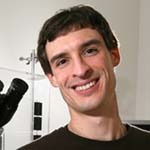The Biosciences Area is pleased to announce that Adam Deutschbauer and Diane Dickel have agreed to take on new leadership positions in the Environmental Genomics & Systems Biology (EGSB) Division. Deutschbauer, previously the department head of Functional Genomics, is rising to the position of EGSB co-deputy for science, and Dickel will assume the role of department head. Deutschbauer’s research has focused on functional genomics technology development, quantitative genetics, microbial evolution, systems biology, and robotics and experimental automation. He is the Biotechnology Component deputy director of the ENIGMA Science Focus Area, where he drives the development of experimental and computational approaches for building models of microbial metabolism, gene regulation, and signal transduction.
Dickel, since joining Berkeley Lab six years ago, has been a leader in functional genomics methods development using a variety of biophysical and molecular biological tools. She has led many research projects using in vivo CRISPR/Cas9 genome editing and single-cell transcriptomics tools to understand the functional necessity of enhancers, noncoding switches that activate gene expression. Dickel uses genomic technologies to study questions in human disease, evolution, development, and gene regulation, and is applying these tools to plant systems.
Sue Celniker, who has served as co-deputy for science in EGSB’s inaugural year, has stepped down to assume the role of science deputy of the Biological Systems & Engineering (BSE) Division. Since joining Berkeley Lab in 1996, Celniker has pioneered Drosophila genetics, and led the effort to characterize the Drosophila transcriptome for the National Human Genome Research Institute’s modENCODE (Encyclopedia of DNA Elements) project. She succeeds Mark LaBarge who left Berkeley Lab in August to pursue a new opportunity at City of Hope.
Antoine Snijders has agreed to be the interim BSE department head of Organismal Systems & Bioresilience, a position also previously held by LaBarge. Snijders’ research focuses on determining the mechanisms that might either predispose or protect an individual from cancer. Together with Jian-Hua Mao, he has recently established the Collaborative Cross Mouse Collection to help screen for linkages between genetic factors that influence motor performance and body weight, as well as gut microbiomes and their linkages to systemic health effects and the environment. Snijders, a native of The Netherlands, joined Berkeley Lab in 2008 after a ten-year career in cancer research at UC San Francisco. A search is underway to identify a permanent department head.
For a complete overview of the revised division leadership teams, visit the organization charts of EGSB and BSE.








